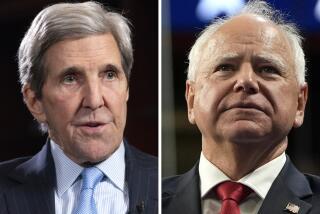Dukakis Scores Bush in Bid to Revive Campaign
- Share via
SPRINGFIELD, Mass. — Conceding for the first time that his campaign has had difficulty getting its message out in recent weeks, Democratic presidential nominee Michael S. Dukakis called Monday for an end to negative campaigning, then sent a rocket of his own toward his Republican opponent, Vice President George Bush.
“The dog days of August are almost over,” Dukakis said. The time has come to “get this campaign up to where it belongs.”
Prison Furloughs
At the same time, Dukakis showed some of the ammunition he has in store should Republican attacks continue. Seizing on one of Bush’s favorite issues, prison furloughs, he demanded: “Why did this Administration grant nearly 16,000 furloughs last year, some of them for as long as 45 days, many of them to convicted drug pushers who Mr. Bush says he wants to execute?”
Dukakis quickly added that the issue is the sort of thing that should be discussed in a “face-to-face debate,” not at “long range.”
Bush has frequently attacked Dukakis over Massachusetts’ furlough program, which used to allow convicted murderers to leave prison on 48-hour passes. Dukakis’ staff has spent the summer examining the federal furlough program to look for counterpunches.
Dukakis’ charge came at a press conference toward the end of an unusual day in which his campaign appeared confused about how to break out of a potentially dangerous stall. The campaign first announced a temporary halt to press conferences, attempting to force reporters to focus on Dukakis’ speeches, then quickly backed down when the tactic threatened to backfire.
Dukakis continued to profess nonchalance.
Attention on Quayle
“Three weeks ago, we could do no wrong,” he said, suggesting that the campaign’s problems were only temporary and related to the tremendous amount of attention that the press has devoted to the travails of the GOP vice presidential candidate, Sen. Dan Quayle of Indiana.
When asked if he thought there was “room for improvement” in his campaign style, Dukakis, who seldom publicly admits error, merely laughed and launched into praise of the speech he gave earlier in the day.
“It’s perhaps not as newsworthy as accusing your opponent of something,” he said, but “I hope (it) was very thoughtful.”
Rehash of Themes
The speech, although billed by Dukakis staff members as a “major” policy address, was almost entirely a rehash of themes--the need to bring economic development to backward areas, to improve education and to expand the availability of health care--that Dukakis has been talking about for months, in some cases years.
Given before a luncheon audience here heavily made up of Dukakis supporters, the speech received generous applause but generated no obvious enthusiasm.
Over the weekend, talking to reporters traveling with him, Dukakis gave some hints about his long-term strategy for the fall campaign, comparing the current race to his 1982 victory over then-Gov. Edward King.
That year, he noted, King ran television advertisements against him “beginning in February, I mean non-stop, never got off, every single week, bang, bang, bang, bang.” Eventually, he said, the public grew tired of King’s attacks and at that point “you come back.”
Beginning with a debate that fall, Dukakis hit King with a series of sharply negative attacks and won the election.
Advisers Worried
For the shorter term of the next few weeks, however, until anticipated debates take place, Dukakis’ aides and advisers are clearly worried, particularly by Bush’s dominance of the airwaves.
Senior campaign staff members met Sunday to discuss the campaign’s problems.
On Monday, New York Gov. Mario M. Cuomo told an Albany, N.Y., news conference that he talked with Dukakis and Dukakis aides over the last few days and advised them: “It’s just a question of refining the message a little bit.”
“The message is a good one,” Cuomo said. “The message is the American people want change.”
Senior Adviser Sent
And also Monday, the Dukakis campaign sent Kirk O’Donnell, who bears the title “senior adviser,” from Boston to western Massachusetts, where Dukakis was conducting a two-day regional swing, for an unscheduled meeting with reporters.
There, O’Donnell said the campaign had decided to take the “extraordinary measure” of canceling press conferences scheduled for Monday and today because “press availabilities have prevented . . . the message from getting out.”
News stories suggesting the campaign was having difficulty responding to repeated GOP attacks were “accurate,” O’Donnell said. Bush, he conceded, had managed to dominate the national television news since the GOP convention, putting Dukakis through “three weeks of being eclipsed.”
‘Invisible Hand’
The campaign, he said, “has gotten lower and dirtier earlier than any previous.” And he conceded that GOP attacks against Dukakis--which he charged were coordinated by an “invisible hand”--had “hurt.”
A half-hour later, Dukakis decided to hold his press conference anyway. O’Donnell later told reporters that the campaign feared that the canceling of the press conference would become the story of the day.
But he also made clear that the campaign still might limit the number of press conferences to better control the forums in which the public sees Dukakis.
More to Read
Get the L.A. Times Politics newsletter
Deeply reported insights into legislation, politics and policy from Sacramento, Washington and beyond. In your inbox twice per week.
You may occasionally receive promotional content from the Los Angeles Times.


![1988: The image of George H.W. Bush towering over his Democratic opponent, Massachusetts Gov. Michael Dukakis, might be the second-most notable contrast in debate history (after the first Nixon-Kennedy debate). What you might remember: At the start of the second meeting held at UCLAs Pauley Pavilion -- CNN newsman Bernard Shaw asked Dukakis, an opponent of the death penalty, one of the more shocking questions in debate history: Governor, if [your wife] Kitty Dukakis were raped and murdered, would you favor an irrevocable death penalty for the killer? Dukakis bland response sealed his fate in the general election. What you might have forgotten: Just about everything else in the two debates.](https://ca-times.brightspotcdn.com/dims4/default/039226c/2147483647/strip/true/crop/586x392+0+17/resize/320x214!/quality/75/?url=https%3A%2F%2Fcalifornia-times-brightspot.s3.amazonaws.com%2F79%2F73%2F27f118f5a47485c01012372b100f%2Fla-pres-debate1988-i5paygkf)








